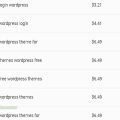Top 8 Free Keyword Research Tools for Bloggers
As a blogger, understanding your audience and knowing what they are searching for is crucial to your success. One of the most effective ways to achieve this is through keyword research. Fortunately, there are numerous free tools available that can help you uncover valuable keywords to enhance your content strategy. Here are eight of the top free keyword research tools that every blogger should consider using.

1. Google Keyword Planner
Google Keyword Planner is perhaps the most well-known keyword research tool. It’s free to use if you have a Google Ads account. This tool provides insights into how often specific keywords are searched and how competitive they are. You can also discover related keywords and get forecasts for the performance of your ad campaigns. Although it is primarily designed for PPC advertising, it’s equally beneficial for bloggers looking to optimize their content. Explore Google Keyword Planner.
2. Ubersuggest
Ubersuggest is another fantastic tool that offers keyword suggestions, search volume data, and SEO difficulty metrics. Created by Neil Patel, Ubersuggest not only provides keyword ideas but also gives insights into what your competitors are doing. This can help you tailor your content to fill gaps in the market. It’s user-friendly and offers a free version that is robust enough for most bloggers. Check out Ubersuggest here.
3. AnswerThePublic
AnswerThePublic is a unique tool that visualizes search questions and suggested autocomplete searches. It’s particularly useful for identifying long-tail keywords and common queries related to your niche. By understanding what questions people are asking, you can create content that directly addresses their needs. This can significantly improve your blog’s relevance. Discover AnswerThePublic.
4. Keyword Tool.io
Keyword Tool.io generates keyword suggestions using Google Autocomplete. While the free version doesn’t provide search volume data, it offers a comprehensive list of long-tail keywords that can be invaluable for bloggers looking to optimize their content. It also supports multiple platforms, including YouTube, Bing, and Amazon, allowing for diverse content strategies. Visit Keyword Tool.io.
5. Google Trends
Google Trends is an excellent tool for analyzing the popularity of search terms over time. It helps you identify trending topics, seasonal variations, and regional interest levels for specific keywords. By leveraging Google Trends, you can stay ahead of the curve and create timely, relevant content that resonates with your audience. Explore Google Trends.
6. Soovle
Soovle is a unique tool that aggregates autocomplete suggestions from various search engines, including Google, Bing, Amazon, and YouTube. This allows you to see what people are searching for across different platforms, providing a broader perspective on keyword opportunities. It’s particularly useful for niche bloggers looking for specific topics that resonate across multiple platforms. Check out Soovle.
7. Moz Keyword Explorer
Moz Keyword Explorer offers a limited free version that can still provide valuable insights. It gives keyword suggestions, search volume, and a difficulty score, helping you assess how competitive keywords are. The tool’s clean interface makes it easy to navigate and find the information you need. Visit Moz Keyword Explorer.
8. Keywords Everywhere
Keywords Everywhere is a browser extension that provides keyword data directly within your search results. While it requires a small fee for credits, it offers a free version that can still be beneficial for bloggers. This tool helps you see search volume, CPC, and competition data as you browse, making it easy to incorporate keyword research into your daily routine. Find out more about Keywords Everywhere.
With these powerful tools at your disposal, you can enhance your blogging efforts and connect more effectively with your audience. Remember, effective keyword research is not just about finding popular terms; it’s about understanding your audience’s needs and delivering content that addresses those needs. Happy blogging!
